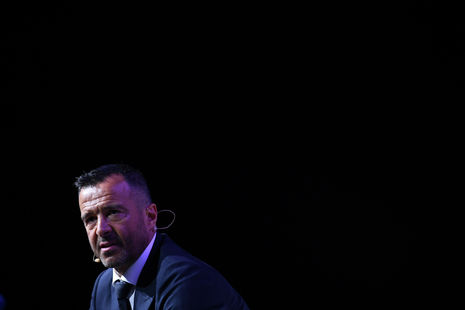FIFA vs. super-agents: could the regulation battle mean relegation for football’s business royalty?
With the January transfer window now firmly closed, Lucia Cork questions whether football is progressively falling under the jurisdiction of player agents and, if so, what this might mean for the sport’s future

Next season could see a complete change in the way the international football industry does business. The expansion of football as a business rather than just a sport has been increasingly obvious over the past thirty years, a shift which has been met with vastly different reactions by fans, administrators, and investors respectively. From the controversial creation of the Premier League in 1992 and the slew of American-inspired marketing schemes that came with it, to the record-breaking transfer fees and wage contracts negotiated in today’s game, the potential for the sport to make people millions has fast become impossible to ignore.
However, FIFA’s latest released version of regulations, scheduled to be implemented from 2024, intend to completely overhaul the business side of the game and restrict the vast sums streaming out of the industry every year via intermediaries. According to their reports, agents were paid a huge $500.8 million by clubs in 2021, an increase on 2020 despite overall spending on international transfers dropping from $5.18 billion to $4.31 billion. On this increase, James Kitching, the Director of Football Regulatory at FIFA, said: “There are some really striking numbers when you look at the fee compared to the [player] salary. That is why we are looking at abusive and excessive practices.”
“The question remains whether these changes will end up making the situation better or potentially worse”
In order to tackle the large amounts syphoned off of deals by intermediaries, FIFA’s plans will cap agent earnings on transfer deals at 10% and 3% on salary negotiations. Back in January 2018, UEFA President Aleksander Čeferin revealed to the Telegraph that, in some cases, an agent will go to a club and say: “‘Look, you will pay me 50 percent of the transfer or the player goes somewhere else.’ Or, ‘You will buy him but you will buy also him and him and him, who you don’t want but you will pay the commission and you will take them.’”
FIFA’s plans, therefore, also aim to limit the behind-the-scenes influence of agents by improving the transparency of all deals. This would involve the mandatory public listing of all transactions and even the details of sums involved where legally possible. Most importantly, all funds involved in a transfer deal would have to go through a FIFA financial clearing process, granting them full access to around $5 billion every year. It is their intention in this move to take back financial control over the sport through tight regulation, and thus shift power away from agents and the influence they wield around the negotiation table. If this goes through, allegations of agents taking disproportionately high payments in order to secure a move less than ideal for their player would theoretically disappear as any corruption would be instantly spotted.
“While reform of the business procedures of the game is undoubtedly necessary [...] FIFA’s rules are more a rearrangement of the problem than the answer”
However, after decades of accusations of corruption directed at FIFA itself and its top officials, the question remains whether these changes will end up making the situation better or potentially worse. This unlimited access would give the administrative body an unprecedented degree of financial control and similarly unprecedented opportunity to corruptly, promote, or impede whatever clubs and agents they see fit. Despite this scepticism, it is hard to see the current influencers of the game – agents – as any less self-interested.
Agents across the world have been outraged by the plans and some, including Jorge Mendes, Mino Raiola, and Jonathan Barnett, have indicated their willingness to challenge the regulations in the courts. Their anger is hardly surprising given the amount each makes annually from their star clients; currently an unknown figure but high considering their percentage fees from client’s salaries on top of intermediary fees in transfers. Mendes’ company Gestifute counts an extreme roster of stars among its clientele, including Cristiano Ronaldo, Bernardo Silva, Ruben Dias, Fabhino, João Cancelo and Ángel Di María among its highest valued players. Raiola, on the other hand, is employed by Zlatan Ibrahimovic, Paul Pogba, Matthijs de Ligt, and Erling Haaland as well as many more. Raiola’s intermediary fee for Pogba’s £89.3 million move to United back in 2016 reportedly amounted to $41.89 million, nearly five times as much as he would have made under FIFA’s proposed regulations. With the upcoming potential transfer of Haaland in the summer, which reportedly will include a new salary of £30 million per year, Raiola ultimately has a lot of money to lose if these changes go through.
His response to the situation has been louder than any other, and he has countered FIFA with his own radical proposal that transfer fees should be abolished altogether. In a recent interview, Raiola claimed the new regulations would restrict the negotiating position of players and would damage salary prospects. His answer was, therefore, to get rid of transfer fees so that the sole focus of negotiation would be on salaries, and so in the direct interests of the players. Raiola even went as far as to say: “The whole system is wrong. It was devised by people who have no knowledge of the profession”.
Raiola’s proposal would concentrate his entire income on players’ wages, matching well with his style of business and coming at a crucial time within the Haaland deal process. Yet, it is perhaps more likely that his comment had a dual intention: partially as a legitimate suggestion and, due to its potential massive impact, to shock. In this sense, it shows that while reform of the business procedures of the game is undoubtedly necessary, given rampant corruption and exploitation at the hands of unregulated intermediaries and clubs, FIFA’s rules are more a rearrangement of the problem than the answer, and perhaps a more radical and professional reassessment of the industry is needed.
But with court proceedings imminent and next season marching steadily closer, time for full reform is running out. What remains is for the courts to decide on the legality of these regulations and, while the conflict rages on, any fan of the sport must ask: does either side want the best environment for the game and its players, or is this just a power battle at the top for the most important thing of all: money?
 News / Uni Scout and Guide Club affirms trans inclusion 12 December 2025
News / Uni Scout and Guide Club affirms trans inclusion 12 December 2025 News / Cambridge study finds students learn better with notes than AI13 December 2025
News / Cambridge study finds students learn better with notes than AI13 December 2025 News / Cambridge Vet School gets lifeline year to stay accredited28 November 2025
News / Cambridge Vet School gets lifeline year to stay accredited28 November 2025 Science / Did your ex trip on King’s Parade? The science behind the ‘ick’12 December 2025
Science / Did your ex trip on King’s Parade? The science behind the ‘ick’12 December 2025 News / Pembroke to convert listed office building into accom9 December 2025
News / Pembroke to convert listed office building into accom9 December 2025









